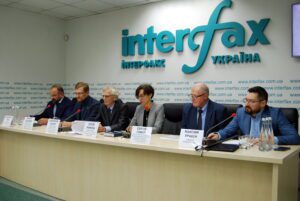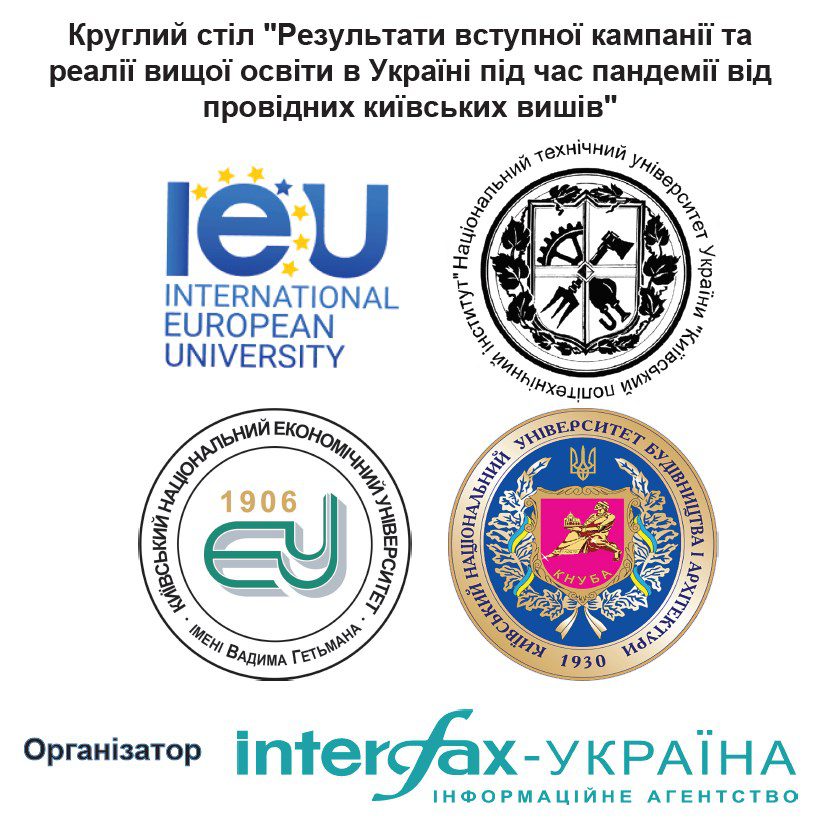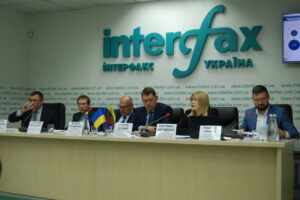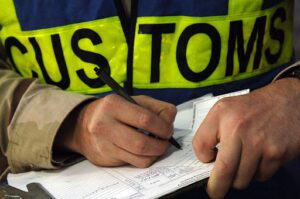
Teachers of Ukrainian universities are actively getting vaccines against COVID-19, the activity of students in vaccination is somewhat lower, the participants of a roundtable entitled “Results of the admission campaign and realities of higher education in Ukraine amid the pandemic at leading Kyiv universities” at Interfax-Ukraine on Tuesday.
Head of the educational department of Kyiv National University of Construction and Architecture, PhD in Technical Sciences Andriy Shpakov, in particular, said that the university is currently preparing the fourth wave of vaccination of teachers.
“We have a fairly high percentage of teachers who are vaccinated and this percentage will increase when we conduct the fourth wave of vaccination. We invite mobile teams that come and vaccinate everyone,” he said.
Shpakov said that the vaccination of both teachers and students is voluntary.
At the same time, he said that “in the recent wave of vaccination, the majority of those vaccinated were exactly students, although students do not really want to be vaccinated in large numbers, so we are conducting explanatory work.”

In turn, Head of the Management and Economics Department of the International European University Yulia Remyha said that the university began to vaccinate teachers in April, inviting mobile vaccination teams for this.
“Vaccination is voluntary, but the teachers take it responsibly. Today, out of all our staff, about 86% have already been vaccinated,” she said.
At the same time, according to Remyha, early September, the university organized vaccinations for students.
“On the part of the administration, both for teachers and for students, everything is done to get vaccinated conveniently, so that health is preserved,” she said.
For his part, Deputy First Vice-Rector, Head of Scientific and Methodological Department of Ihor Sikorsky Kyiv Polytechnic Institute (KPI) Serhiy Hozhiy said that the university during the summer invited vaccination teams for voluntary vaccination of teachers and students.

“In KPI, more than 80% are already vaccinated,” he said.
Commenting on the living conditions of nonresident students, Hozhiy said that “special rooms and blocks, isolation wards have been organized in the hostels, where sick students are accommodated, but no one is forcing them to vaccinate.”
Vice-Rector for scientific and pedagogical work of Vadym Hetman Kyiv National Economic University Anatoliy Kolot said that this university is also conducting explanatory work on the need for vaccination.
“Nobody is forcing. We appeal to conscience. We have involved public and trade union organizations, student government. There have already been two waves of centralized vaccination, we are conducting another wave on September 29-30,” he said.
At the same time, Kolot said that universities need more detailed explanations regarding the vaccination rate for 80% of employees.

“Obviously, there should be more explanations from our central authorities, because everything is limited to the 80% standard. But explanations are needed, what to do if there are people who are contraindicated in vaccination, and there are people who have been ill and they have antibodies,” he said.
Kolot said that the university is currently collecting information on the number of employees who have been ill.
At the same time, he drew attention to the fact that “it is not clear what to do if the whole family has been ill, but only one family member has turned to the family doctor and has a confirmation of the illness.”
“Where can those family members who have been ill get a certificate, if only one family member is recorded? There are such cases,” he said.
COVID-19, HOZHIY, INTERNATIONAL EUROPEAN UNIVERSITY, KNUBA, KOLOT, KPI, KYIV NATIONAL ECONOMIC UNIVERSITY, REMYHA, SHPAKOV, TEACHERS, URAKIN

Ukraine’s accession to the European Convention on a Common Transit Procedure is expected at the end of the second quarter of 2022, already in the third quarter Ukrainian enterprises will be able to go in transit through 35 countries on the principle of one vehicle – one transit declaration – one guarantor’s undertaking, Director of the Department for the Implementation of the International Transit System of the State Customs Service Serhiy Demchenko has said.
During a roundtable entitled “Implementation of customs procedures in accordance with EU practice: what changes may Ukrainian business expect? Practical aspects” held at Interfax-Ukraine, he said that these are all EU countries, the European Free Trade Association (EFTA) countries, Turkey, Serbia, North Macedonia and the U.K.
The expert recalled that joining the Convention is stipulated by the Ukraine-EU Association Agreement and shall intensify international trade due to the establishment of joint transit procedures by Ukraine with the countries-members of the Convention and their use of a single technology – the New Computerised Transit System (NCTS) system. This system allows the member countries to exchange customs data in real time and monitor goods at every stage of transportation.

“The common transit system provides for four main special transit simplifications for enterprises: the authorized consignor, the authorized consignee, special sealing and a guarantee,” Demchenko said. He added that new approaches are being applied to the standard guarantee amount, which will reduce the amount when it is used by 50%, 70% or 100%.
To obtain simplifications in NCTS, the legislation provides for a special procedure. The guarantee can be provided by companies that have received the financial guarantor status. To submit a transit declaration to NCTS, a company needs to register on the Trader’s Portal in the “personal account” on the “Single Window for International Trade” portal.
“Ukrainian legislation on common transit has already been generally shaped and is in line with the best European practices,” International Key Expert on Customs reform of the EU4PFM Programme to improve Public Financial Management (PFM) in Ukraine, former Deputy Chairman of the Lithuanian Customs Service Vytenis Ališauskas said during the roundtable.

To date, more than 3,000 customs officials are registered in the system, more than 180 companies have access to the Trader’s Portal, about 300 T1UA declarations have been submitted, three companies have received the financial guarantor status, and the Helpdesk operates.
As reported, NCTS is still used in Ukraine on a national scale. However, as a representative of the State Customs Service said, “enterprises that use NCTS (have submitted 50 or more declarations) can submit documents to the State Customs Service for simplifications, which will be valid even after Ukraine joins the Convention, that is, with the international application of the system.”
ANISCHENKO, CUSTOMS, EXPORTERS_CLUB_OF_UKRAINE, LITVINOVA, UKRAINIAN_CHAMBER_OF_COMMERCE_AND_INDUSTRY, URAKIN, ДЕМЧЕНКО, МОСКАЛЕНКО, ЧИЖИКОВ
Ukraine is carrying out customs reform, one of the directions of which is the introduction of principles and instruments used in the EU countries. The EU, in turn, assists Ukraine in the development and implementation of such customs instruments. This was emphasized by the participants in the round table “Implementation of customs procedures in accordance with European practice: what changes should Ukrainian business expect? Practical aspects,” which took place at the press center of the Interfax-Ukraine news agency on September 21, 2021.

The event was attended by President of the Exporters’ Club of Ukraine Yevhenia Litvinova, President of the Ukrainian Chamber of Commerce and Industry Hennadiy Chizhikov, representatives of business associations, Director of the Customs Policy Department of the Finance Ministry of Ukraine Oleksandr Moskalenko, Director of the International Transit System Implementation Department of the State Customs Service of Ukraine Serhiy Demchenko, Director of the Department for Customs Audit and Registration of Persons of the State Customs Service Svitlana Anischenko, Head of the AEO Support Department of the Customs Control and Customs Clearance Organization Department of the State Customs Service Andriy Teply, the EU4PFM international expert on customs issues, ex-deputy head of customs of the Republic of Lithuania Vytenis Alisauskas.
Organizer and moderator of the round table Maksim Urakin noted that now the State Customs Service provides 35-40% of revenues to the state budget, and these figures have remained stable over the past years.

“In general, in January-August 2021, the State Customs Service fulfilled the revenue plan by 107% and transferred UAH 291 billion to the state budget (against the planned figure of UAH 272 billion). At the same time, in the eight months of this year, compared to the same period last year, receipts from customs payments increased by UAH 76 billion, or 36%,” Urakin emphasized.
In addition, the organizer noted that, based on the monitoring of data of Ukraine’s foreign economic activity in 2021, conducted by the Experts Club analytical center, the state budget revenues will continue to grow, as the country continues to increase the volume of international trade.
“Thus, exports to the EU countries in the first half of 2021 grew by 43.9% compared to the same period last year, imports – by 26.3%. The total volume of trade with the EU countries for the six months amounted to almost $ 25 billion, with China – about $ 9 billion. These data indicate that the stimulation of foreign trade through the harmonization of customs legislation is a key factor in the financial stability of the state, ensures budget replenishment and economic growth,” the speaker said.
The speakers provided an overview of the principles laid down in the EU Customs Code and the instruments used by EU countries to implement these principles; what of them should be expected in Ukraine (including thanks to the support of European partners), and which of these customs instruments are already being introduced or are close to being introduced in Ukraine – in particular, the common transit regime (NCTS), the Authorized Economic Operator Program (AEO) and customs audit.
Of particular interest to business representatives was the system of customs simplifications, which is used in the EU countries and is now being implemented in Ukraine – in particular, as part of implementation of the Association Agreement between Ukraine and the EU.
Yevhenia Litvinova, the President of the Exporters Club of Ukraine, in turn, emphasized that it is important for business to know what changes await us.
“Do opportunities or additional costs await us? The round table will give an impetus to better understand the expected changes, to prepare for them, so that our exports after 2022 are painless, efficient and active,” she stressed.
“We want everything to be good at once, but the customs reform is not an easy process. But what we see now gives a large share of positive. And above all, we are moving towards the EU, including mentally,” Hennadiy Chizhikov, the President of the Ukrainian Chamber of Commerce and Industry, said.
According to Vytenis Alisauskas, the EU4PFM international expert on customs issues, the ex-deputy head of the customs of the Republic of Lithuania, the changes to the EU Customs Code fixed the new mission of the European customs. If earlier the customs had to protect the local market and collect customs duties, now it is becoming part of the international trade chain. And the competitiveness of local exporters depends on how it works.
The international expert focused on the tasks that must be solved with the help of the EU Customs Code – so that it would be profitable for an entrepreneur to be honest, so that a conscientious business could save his time and money, so that some of the processes that are (as a rule) performed at customs could be carried out by such a business on its own.

“An authorized economic operator (AEO) is a symbol of a conscientious entrepreneur who is trusted by customs and who has significant advantages in customs clearance,” he said.
Alisauskas highlighted the key tools used by European customs to save time for fair business – in addition to the simplification system (the AEO program and simplification in the general transit regime), this is a customs audit system (post-audit) and a customs risk management system.
International partners help create and implement these principles and tools in Ukraine.
Oleksandr Moskalenko, the Director of the Customs Policy Department of the Finance Ministry of Ukraine, stressed that the country is now working in the vector defined by the Constitution – European integration. Europe is our largest trading partner, and therefore, it is important to approximate, introduce the best European practices – so that European and Ukrainian customs work according to the same rules.
“We have completed a large layer of legislative changes. Now both the customs and the business must deploy all this. We need training, enlightenment, promotion. Therefore, I would like international partners to help us also conduct business training. So that all participants in the process not only have the rights, but also know how to use them,” he said.
In his opinion, the acceleration of customs clearance should be achieved not at the expense of a command to customs officers to “work quickly,” but at the expense of an efficiently built system.
“We are moving towards building partnerships between business and customs. It will take some time,” he concluded.

Serhiy Demchenko, the Director of the Department for the Implementation of the International Transit System of the State Customs Service, said that in the second quarter of 2022 Ukraine is expected to join the Convention on the Common Transit Procedure, and already in the third quarter of 2022 – the stage of Ukraine’s international application of the NCTS system.
“In a year, Ukrainian enterprises will be able to transit with 35 countries (including all EU countries, EFTA, Turkey, Great Britain) on the principle of “one vehicle – one transit declaration, one financial guarantee”,” Demchenko said.
He also informed about the main four special transit simplifications that the general transit system provides: an authorized consignor, an authorized consignee, self-sealing of a special type, a common financial guarantee. Regarding the guarantee, the Customs Service representative emphasized that new approaches are being applied that make it possible to reduce the amount of security for the base amount of the guarantee when it is used – by 50%, 70%, or 100%.
“As you know, now NCTS is used on a national scale, however, enterprises using this system (having issued 50 declarations or more) can apply for simplifications, which will also be valid for the international application of the system. Currently, the system has registered more than 3,000 officials of customs authorities, more than 180 companies gained access to the Trader Portal, about 300 T1UA declarations were submitted, three companies received the status of a financial guarantor, Helpdesk works, seven seminars were held with subjects of foreign economic activity,” the expert summed up.
According to Andriy Teply, the head of the AEO support department of Customs Control and Customs Clearance Organization at the State Customs Service, the full implementation of the functioning of the Authorized Economic Operator (AEO) Program is a priority of the State Customs Service for the next 2-3 years. Among the main challenges, he named the transformation of customs-business relations: such relations today are built on the distrust of business in customs, but should be open and partnership.
As you know, the Authorized Economic Operator Program has been operating in Ukraine since August 2020. Its implementation is stipulated by the Association Agreement between Ukraine and the EU. It provides a number of simplifications and advantages in customs clearance. To obtain the status, it is necessary to go through a rather difficult and lengthy authorization procedure.
“As of September 2021, the State Customs Service received five applications for authorization of the AEO. Of these, one enterprise was granted authorization as the AEO, two were denied an assessment, while two applications are under preliminary consideration,” the expert said.
Svitlana Anischenko, the Director of the Department for Customs Audit and Personnel Registration of the State Customs Service, stressed that customs audit in Europe is more focused on foreign economic activity and acts as a system that allows speeding up the process of customs clearance.
“We feel the need to create a high-quality IT tool – with the support of European partners, the first version of the Customs Audit information system was created, in August-September it is tested by customs. A month ago, an agreement was reached with European partners to support the creation of the second version. Also, the development of a risk management system for the selection of enterprises for customs audit has begun,” she said.
The event record can be viewed here: https://www.youtube.com/watch?v=4VBpReShdr8.
The organizers of the event are the European Union Project EU4PFM “Public Finance Management Support Program in Ukraine,” the Ukrainian Chamber of Commerce and Industry, the Exporters’ Club of Ukraine, and the Interfax-Ukraine news agency.
ANISCHENKO, CUSTOMS, EXPORTERS_CLUB_OF_UKRAINE, LITVINOVA, UKRAINIAN_CHAMBER_OF_COMMERCE_AND_INDUSTRY, URAKIN, ДЕМЧЕНКО, МОСКАЛЕНКО, ЧИЖИКОВ

Ukraine’s real gross domestic product (GDP) in the second quarter of 2021 grew by 5.4% compared to the second quarter of 2020, while falling by 2.2% in the first quarter of this year.
Alfa-Bank (Kyiv) has downgraded the forecast for real GDP growth in Ukraine in 2021 to 3.7% instead of 4.3% in the April forecast and the average annual inflation in 2021 to 9.4% instead of the previously predicted 8.5%.
Oxford Economics has downgraded the forecast for Ukraine’s GDP growth in 2021 to 4% from 4.4% in the July forecast, and the risks of further lockdowns and expectations of tightening fiscal and monetary policy led to a deterioration in the forecast for economic growth in 2022 from 4.2% to 3.5%.
Analysts at Morgan Stanley have downgraded the estimate of Ukraine’s GDP growth in 2021 to 3.4% compared to 4.5%, as previously expected, and predict a 4.2% GDP growth in 2022.
The Kyiv School of Economics (KSE) has worsened its 2021 GDP growth expectations to 3.6% from 4.7% in its April forecast and improved its 2022 GDP growth forecast – 4.4% from 2. 7%, Head of the KSE Center of Macroeconomic Modeling Yuriy Sholomytsky has said.
The deficit of Ukraine’s foreign trade in goods in January-June 2021 narrowed by 12.7% compared to January-June 2020, to $1.327 billion from $1.519 billion, the State Statistics Service reported.
The surplus of Ukraine’s balance of foreign trade in the first half of 2021 fell by 46.3% compared to the first half of last year, to $0.41 billion.
The growth of consumer prices in Ukraine in annual terms in July 2021 accelerated to 10.2% from 9.5% in June, the State Statistics Service has reported.
The deficit of the state budget for 2022 in the bill for the first reading is provided at the level of 3.5% of GDP in accordance with the Budget Declaration for three years, while there is no possibility to revise this indicator for the second reading, Finance Minister of Ukraine Serhiy Marchenko said in interview.
The total public debt of Ukraine in July 2021 increased by 0.48% in U.S. dollars and amounted to $ 92.96 billion, while it decreased by 0.6% in hryvnias, to UAH 2.499 trillion, according to data on the website of the Ministry of Finance.
Industrial production in Ukraine in July 2021 increased by 0.2% compared to July 2020, while in June the growth was 1.1%, in March – 5.4%, and in April – 13%.
Exports of products of the agro-industrial complex of Ukraine decreased by 8.8 p.p., from 44% in January-July 2020 to 35.2% in January-July 2021, while the share of these products in the total imports into the country over the same period – by 0.9 percentage points, to 11.3%, the Ministry of Agrarian Policy and Food reported.
Retail goods turnover in Ukraine in June 2021 year-over-year grew by 13% year-over-year in comparable prices, while in May the figure was 22.7%.
Publisher of “Open4Business”, PhD in Economics, Maksim Urakin

On Tuesday, September 21, at 11.00, the press center of the Interfax-Ukraine news agency will host a roundtable talk entitled “Implementation of customs procedures in accordance with EU practice: what changes may Ukrainian business expect? Practical aspects.” Participants include President of the Ukrainian Chamber of Commerce and Industry Hennadiy Chyzhykov; President of the Ukrainian Exporters Club Yevhenia Lytvynova; international expert of the EU Public Finance Management Support Programe for Ukraine (EU4PFM) on customs issues, former Deputy Chairman of the Customs of the Republic of Lithuania Vytenis Alisauskas; Director of the Department of Customs Policy of the Ministry of Finance of Ukraine Oleksandr Moskalenko; Director of the Department of Implementation of the International Transit System of State Customs Service of Ukraine Serhiy Demchenko; Director of the Department of Customs Audit and Person Registration of the State Customs Service of Ukraine Svitlana Anishchenko; Head of the Directorate for Support of Authorized Economic Operators of the Department for Organization of Customs Control and Customs Clearance of the State Customs Service of Ukraine Andriy Teply; representatives of business associations, media, experts of the Reform Support Team of the Ministry of Finance and State Customs Service. Moderator of the event is its organizer Maksim Urakin. Working languages of the roundtable talk: Ukrainian, Russian, English (8/5a Reitarska Street). The broadcast will be available on the YouTube channel of Interfax-Ukraine. Due to quarantine restrictions, the number of seats in the press center is limited. Admission of journalists requires registration on the spot. Details by phone: (068) 099 1709.
The 11th international squash championship “Zenit Black Sea Open 2021” took place in Odesa. The competition was attended by players from England, Australia, Germany, Wales, Egypt, Romania, the United States, Moldova, Belarus and other countries, as well as sportsmen from Kyiv, Lviv, Kharkiv, Dnipro, Khmelnytsky, Poltava, Kherson, Odesa.

The winner in the PRO category among men (the main category of the tournament) was squash player from Egypt Ahmed Mohamed, and among women in the PRO category the first place was taken by Anastasiya Kostiukova from Ukraine.

The tournament had been held for four days on the courts of the SPORT LIFE fitness center.
The organizers of the tournament, Dmytro Scherbakov and Maksim Urakin, previously stated the need to popularize squash in particular and sports in general through organizing tournaments and attracting Ukrainian business to support sports. The main goal of the tournament, according to the organizers, was to strengthen sports and cultural ties between the countries and sports players, to popularize and develop squash in Ukraine, as well as to improve the skill level of young squash players.

Some 150 participants competed for awards in eight categories. The winners of the competition became:
Men (PRO Category):
First place – Ahmed Mohamed (Egypt);
Second place – Clegg David (Australia);
Third place – Dmytro Scherbakov Jr. (Ukraine).
Women (PRO Category):
First place – Anastasiya Kostiukova (Ukraine);
Second place – Sofiya Zrazhevska (Ukraine);
Third place – Olga Khmelevskaya (Belarus).
Men (Amateurs category):
First place – Oleksiy Alekseyenko (Ukraine);
Second place – Jack Lake (England);
Third place – Yevhen Popko (Ukraine).
Men (Category 40+):
First place – Kostiantyn Rybalchenko (Ukraine);
Second place – Tymofiy Zheludkov (Ukraine);
Third place – Thornton Ben (England).
Men (Category 45+):
First place – Viktor Kovalchuk (Ukraine);
Second place – Oleksandr Kostevych (Ukraine);
Third place – Dmytro Baluta (Ukraine).
Women (Amateurs category):
First place – Olha Zadorozhna (Ukraine);
Second place – Maryana Batrshina (Ukraine);
Third place – Valentyna Khomovska (Ukraine).
Youth tournament (Category BU-15):
First place – Roman Shkarupylo (Ukraine);
Second place – Artem Panchenko (Ukraine);
Third place – Danylo Kuryliak (Ukraine).
Category GU-15:
First place – Anastasiya Krykun (Ukraine);
Second place – Yelyzaveta Suprun (Ukraine);
Third place – Khrystyna Beheba (Ukraine).

Tournament organizers and sponsors:
Zenit Black Sea Open is the largest international squash tournament in the history of independent Ukraine. The scale of the championship is demonstrated both by the number of countries and participants, and by the large number of organizations involved in the preparation and holding of competitions.
The main organizer and fitness partner of the event was traditionally the national chain of fitness centers number one “Sport Life,” as well as the MaxEvents company.
The title sponsor was the SOCAR fuel and energy company.
The championship is sponsored by SOLARIS AGROLUX, Tecnifibre, Reima.
Official beer of the tournament is from TERMOPUB.
Official wine partner is SHABO.
The partner of the party and the hotel of the tournament is Premier Hotel Odesa.
The medical partner of the championship is the Adonis medical group.
The fruit partner is USPA fruit.
The main media partner of the tournament is Interfax-Ukraine.
MAXEVENTS, ODESA, SCHERBAKOV, SHABO, SOCAR, SPORTS, SQUASH, URAKIN, ZENIT_BLACK_SEA_OPEN, АДОНИС